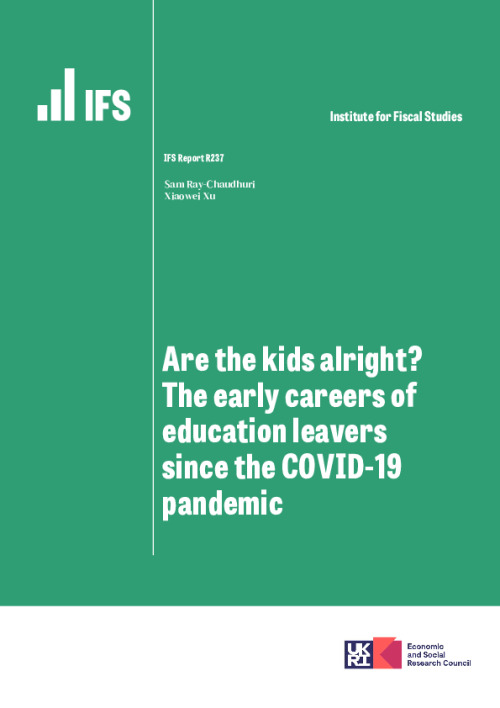Introduction
There is substantial evidence from the UK and other countries that entering the labour market during a recession leads to persistent negative effects on employment and earnings (von Wachter, 2020). Young people graduating from school or university during an economic downturn have a harder time finding employment, and those who do find work may be forced to take jobs that are less well-suited to their skills and the development of those skills. This can keep them on poorer career trajectories for years to come. The lack of new job vacancies also hampers the ability of young people to move between jobs in search of a better match, which has been shown to be an increasingly important way for young people to advance their careers and increase their pay (Blundell et al., 2020). The disruption caused by recessions leaves persistent scars for new labour market entrants, which can take several years to recover from (Cribb, Hood and Joyce, 2017).
The COVID-19 pandemic was an unprecedented labour market shock. Entire sectors were shut down and, across the economy, firms responded to the huge uncertainty by pausing hiring. This led to a sharp rise in numbers not employed or working zero hours, which was particularly concentrated among younger age groups. The pandemic and lockdowns led to a deterioration in mental health, which again was largest for young people (Banks and Xu, 2020). As a result, in the initial stages of the pandemic, many predicted that young people entering the labour market during the pandemic would see long-lasting scars on their career prospects (see, for example, Del Bono and Holford, 2020; Johnson, 2020). However, the scale of the support package implemented by the UK government and the rapid rebound of the economy as the pandemic subsided may have gone some way toward mitigating – and perhaps reversing – these effects. The unusual nature of the pandemic and subsequent recovery means that it is not obvious what to expect.
In this report, we present the first evidence on how the cohorts of young people who entered the labour market during the pandemic have fared up to now. In Section 2, we discuss why we might expect the pandemic to lead to scarring effects, documenting how labour market outcomes evolved over the pandemic and comparing trends with the 2008 recession to demonstrate the magnitude of the COVID-19 shock for young people. In Section 3, we focus on the cohorts of young people who entered the labour market during the COVID-19 years, or just before, comparing their employment rates and multiple measures of job quality with those of earlier cohorts to assess the extent to which they are likely to experience long-term scarring as result of the pandemic. In Section 4, we discuss the prospects for future cohorts due to enter the labour market in the coming years. We conclude in Section 5.
Key findings
1. Evidence from previous recessions tells us that young people who enter the labour market during downturns tend to experience worse career outcomes that take several years to recover from. In 2020–21, the total number of hours worked by those aged 16–24 dropped by a fifth year-on-year. The loss in working experience and the reduced ability to move up the career ladder during the pandemic, coupled with shocks to mental health, could be expected to leave long-lasting scars on recent graduates.
2. The cohort that graduated in 2020, particularly individuals with university degrees, initially saw worse outcomes on some measures. They struggled to find work three to six months after graduation, were less likely to receive on-the-job training in their first year, and those with degrees started in lower-paid occupations than previous cohorts.
3. However, the employment rates of the 2020 cohort had fully recovered nine to twelve months after graduation, and one to two years after graduation there were no obvious differences from the previous cohort across a number of job quality measures. It appears that the rapid economic recovery and the boom in new job vacancies since 2021 allowed new entrants to quickly recover lost ground.
4. Apart from the 2020 cohort, other cohorts who entered the labour market during or just before the pandemic did not see slower occupational progression or have worse job quality, with one exception: those from disadvantaged backgrounds were more likely to be in the same job that they held at school or university. However, there is, as yet, no indication that this has affected other measures of their job quality.
5. It may be that some negative effects of the COVID-19 pandemic are yet to materialise. Gaps between the COVID-19 cohorts and earlier cohorts may emerge as the labour market becomes less tight, as the loss of experience and training they experienced puts them at a disadvantage. Working from home may have affected the quality of on-the-job training and learning, effects that are unlikely to be captured by short-term measures of job quality.
6. Perhaps more concerning are the prospects for the next two cohorts of graduates. They will have suffered an incredibly unfortunate double whammy, with disruption during a key phrase of their education due to the pandemic, followed by an economy in recession upon entry into the jobs market. Despite these challenges, strained public finances mean that government support is likely to be sparse.











